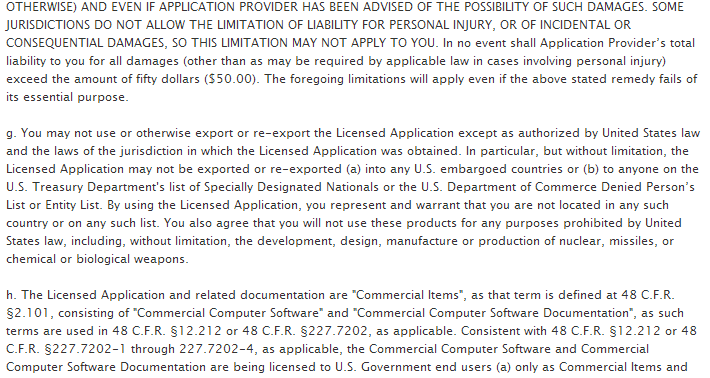What You’ve Agreed To… Win?

If you’ve ever downloaded an app via iTunes, Apple has probably insisted that you first agree to its End User License Agreement, or EULA. Unless you are an interested attorney or have strange hobbies, you likely clicked through without reading further. There’s good reason for that. Below is a small taste of the stuff you’d see if you were intent on muddling your way through it:
This license granted to You for the Licensed Application by Application Provider is limited to a non-transferable license to use the Licensed Application on any iPhone or iPod touch that You own or control and as permitted by the Usage Rules set forth in Section 9.b. of the App Store Terms and Conditions (the “Usage Rules”). This license does not allow You to use the Licensed Application on any iPod touch or iPhone that You do not own or control, and You may not distribute or make the Licensed Application available over a network where it could be used by multiple devices at the same time. You may not rent, lease, lend, sell, redistribute or sublicense the Licensed Application.
Yuck. Who knows what kind of nefarious gremlins are hidden in there? For most of us, figuring that out is incredibly difficult if not outright impossible, and regardless, we want to use the service. The payoff for struggling through this stuff is zero.
Except when there’s a reward hidden inside.
In 2003 or 2004, a small software company called PC Pitstop wanted to test to see — unscientifically — how often EULAs were ignored yet agreed to. So they added a special section in theirs, which read, poor grammar, usage, and all: “A special consideration which may include financial compensation will be awarded to a limited number of authorize licensee to read this section of the license agreement and contact PC Pitstop at consideration@pcpitstop.com. This offer can be withdrawn at any time.” The “financial compensation” turned out to be a check for $1,000.
PC Pitstop was true to its word, and ended up paying the first claimant — and it was likely well worth the price. The company made anti-spyware software and used this as a launching pad for a PR campaign, which yielded an article, available here, recounting their efforts. The article also took issue with how other companies bury disclosures about data collection in a half-dozen printed pages of legal gibberish.
But the first claim didn’t come overnight. In fact, it didn’t come quickly at all. It took four months and more than 3,000 downloads before someone emailed the consideration@pcpitstop.com address. Because no one reads these things.
Bonus fact: More evidence that you didn’t read the iTunes EULA? The image above comes from it (here, again, is the whole thing), and you probably didn’t notice the last line of paragraph (g). It reads “You also agree that you will not use these products for any purposes prohibited by United States law, including, without limitation, the development, design, manufacture or production of nuclear, missiles, or chemical or biological weapons.” So please, do not create weapons of mass destruction in iTunes. You wouldn’t want to lose access to your playlist on your quest for world domination.
From the Archives: Paper Trail: How your color printer may be tracking your documents.
Related: This. In case you want to start on that nuclear weapon you’re building…
